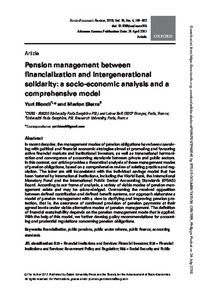Pension management between financialization and intergenerational solidarity: a socio-economic analysis and a comprehensive model

2018
16
4
Oct.
791-822
pension scheme ; financialisation ; public finance
Social protection - Old age benefits
https://doi.org/10.1093/ser/mwx015
English
Bibliogr.
"In recent decades, the management modes of pension obligations have been coevolving with political and financial economic strategies aimed at promoting and favouring active financial markets and institutional investors, as well as transnational harmonization and convergence of accounting standards between private and public sectors. In this context, our article provides a theoretical analysis of these management modes of pension obligations, based on a comprehensive review of existing practice and regulation. The latter are still inconsistent with the individual savings model that has been fostered by international institutions, including the World Bank, the International Monetary Fund and the International Public Sector Accounting Standards (IPSAS) Board. According to our frame of analysis, a variety of viable modes of pension management exists and may be acknowledged. Overcoming the received opposition between defined contribution and defined benefit systems, our approach elaborates a model of pension management with a view to clarifying and improving pension protection, that is, the assurance of continued provision of pension payments at their agreed levels under viable alternative modes of pension management. The definition of financial sustainability depends on the pension management mode that is applied. With the help of this model, we further develop policy recommendations for accounting and prudential regulations concerning pension obligations."
Digital
The ETUI is co-funded by the European Union. Views and opinions expressed are however those of the author(s) only and do not necessarily reflect those of the European Union or the ETUI.